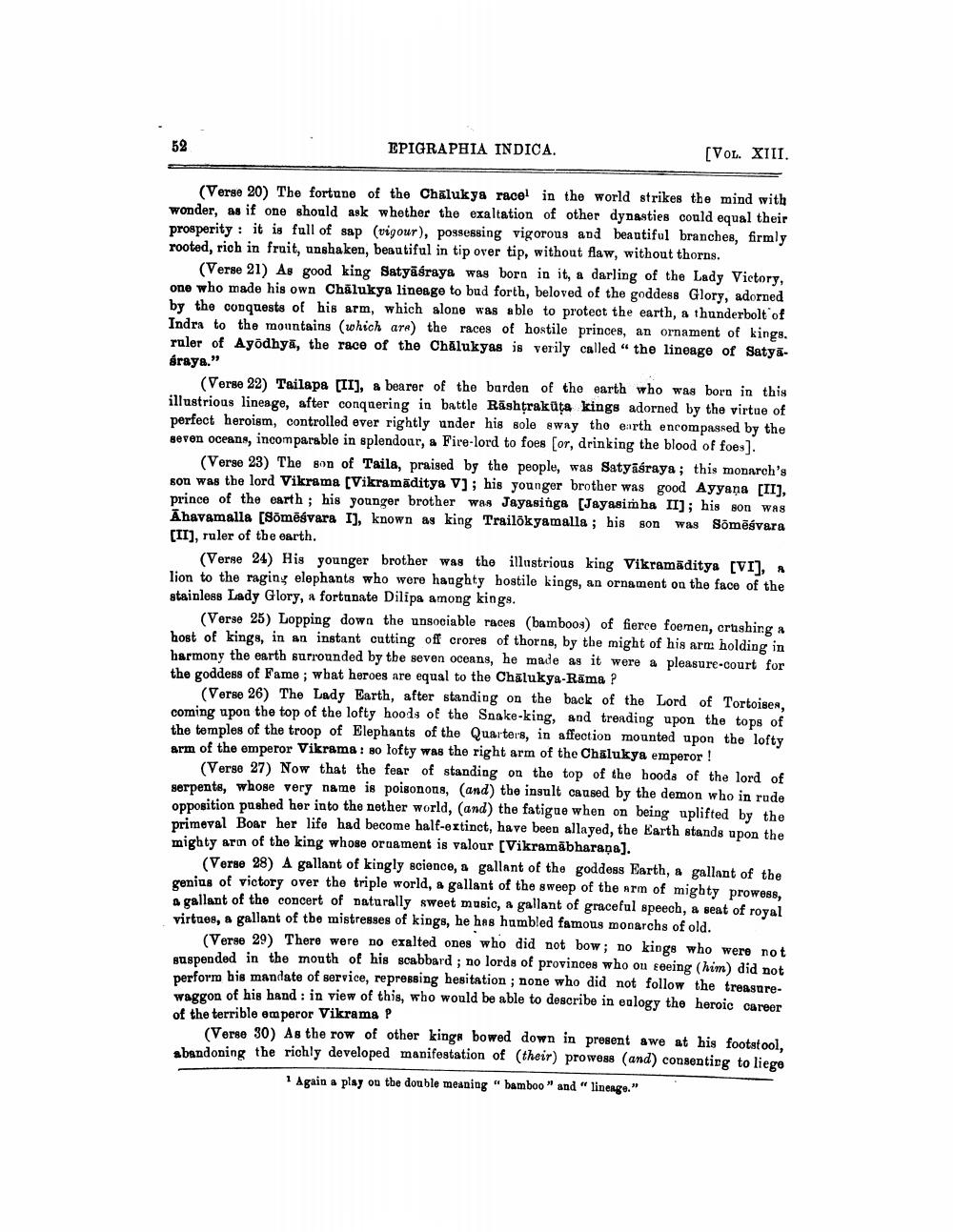________________
EPIGRAPHIA INDICA.
(VOL. XIII.
(Verse 20) The fortune of the Chalukys racel in the world strikes the mind with wonder, as if one should ask whether the exaltation of other dynasties could equal their prosperity: it is full of sap (vigour), possessing vigorous and beautiful branches, firmly rooted, rich in fruit, unshaken, beautiful in tip over tip, without flaw, without thorns.
(Verse 21) As good king Satyāśraya was born in it, a darling of the Lady Victory, one who made his own Chālukya lineage to bud forth, beloved of the goddess Glory, adorned by the conquests of his arm, which alone was able to protect the earth, a thunderbolt of Indra to the mountains (which are) the races of hostile princes, an ornament of kings. ruler of Ayodhyā, the race of the Chalukyas is verily called “the lineage of Satyasraya."
(Verse 22) Tailapa [II], a bearer of the barden of the earth who was born in this illustrious lineage, after conquering in battle Rāshtrakūta kings adorned by the virtue of perfect heroism, controlled ever rightly under his sole sway the earth encompassed by the geven oceans, incomparable in splendour, a Fire-lord to foes (or, drinking the blood of foes).
(Verse 23) The son of Taila, praised by the people, was Satyāśraya; this monarch's son was the lord Vikrama (Vikramāditya V] ; his younger brother was good Ayyana (II), prince of the earth; his younger brother was Jayasinga (Jayasimha II]; his son was Āhavamalla (Sõmēsvara I), known as king Trailökyamalla ; his son was Sõmēsvara (II), ruler of the earth.
(Verse 24) His younger brother was the illustrious king Vikramaditya [VI), lion to the raging elephants who were haughty bostile kings, an ornament on the face of the stainless Lady Glory, a fortanate Dilipa among kings.
(Verse 25) Lopping down the unsociable races (bamboos) of fierce foemen, crushing * host of kings, in an instant cutting off crores of thorns, by the might of his arm holding in barmony the earth surrounded by the seven oceans, he made as it were a pleasure-court for the goddess of Fame; what heroes are equal to the Chalukya-Räma ?
(Verse 26) The Lady Earth, after standing on the back of the Lord of Tortoiser. coming upon the top of the lofty hoods of the Snake-king, and trending upon the tops of the temples of the troop of Elephants of the Quarters, in affection mounted upon the lofty arm of the emperor Vikrama: so lofty was the right arm of the Chalukya emperor !
(Verse 27) Now that the fear of standing on the top of the hoods of the lord of serpents, whose very name is poisonons, (and) the insult caused by the demon who in rude opposition pushed her into the nether world, (and) the fatigue when on being uplifted by the primeval Boar her life had become half-extinct, have been allayed, the Earth stands upon the mighty arm of the king whose ortament is valour (Vikramābharana).
(Verse 28) A gallant of kingly science, a gallant of the goddess Earth, a gallant of the genius of victory over the triple world, a gallant of the sweep of the arm of mighty prowess,
vallant of the concert of naturally sweet music, a gallant of graceful speech, a seat of royal virtuos, a gallant of the mistresses of kings, he has humbled famous monarchs of old.
(Verse 29) There were no exalted ones who did not bow; no kings who were not suspended in the mouth of his scabbard ; no lords of provinces who on seeing him) did not perform bis mandate of service, repressing hesitation ; none who did not follow the trengarewaggon of his hand : in view of this, who would be able to describe in eulogy the heroic career of the terrible emperor Vikrama P
(Verse 30) As the row of other kings bowed down in present awe at his footstool, abandoning the richly developed manifestation of (their) prowess (and) consenting to liege
1 Again a play ou the double meaning "bamboo " and " lineage."




